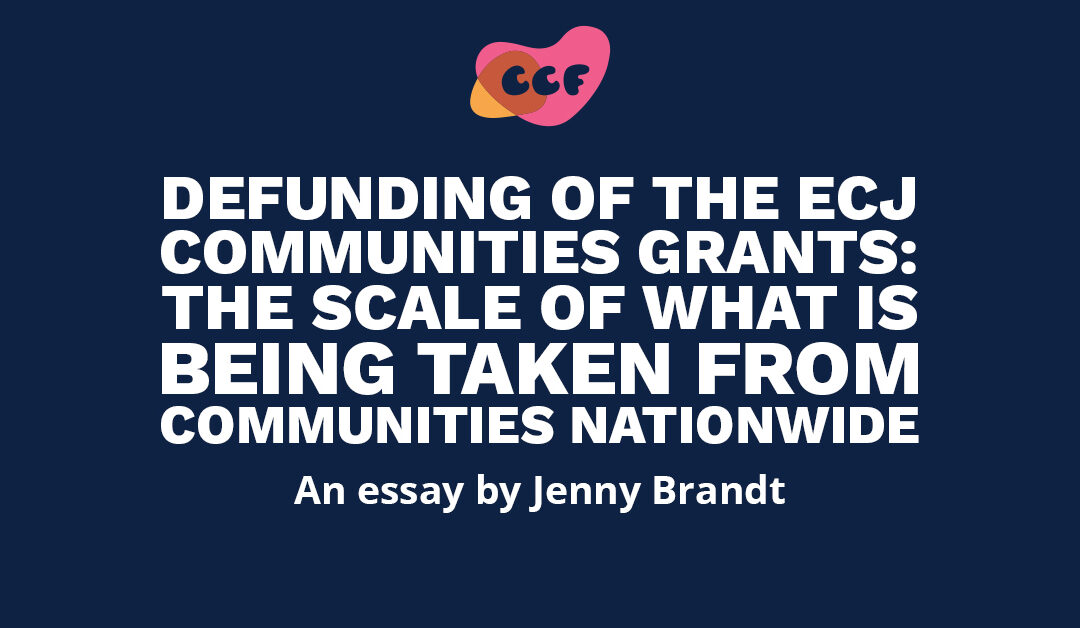By Jenny Brandt, environmental justice advocate
The actions of the Federal Government have caused harm. For grantees, this has in some cases led to them laying off staff, spending limited resources without reimbursement, and may even result in threatening an organizations’ existence. It has certainly eroded relationships built with communities over years. And life-saving measures that were going to be implemented will not.
If you read our earlier blogs on The Hub, you’d have heard about Community-Centric Fundraising (CCF)´s participation as a thought partner and trainer for the Mountains & Plains Environmental Justice Grants Hub through the Thriving Communities Grantmaking Program (TCGM). We were among a group of organizations thrilled to be part of a new model in grantmaking.
The new model designated 11 regional Environmental Justice Thriving Communities Grantmakers to handle the burdensome government reporting and allocate subgrants to organizations previously unable to access Federal funding to address environmental harm in their communities.
We are still processing the news that the Region 8 Grantmaker Hub has closed well before 2027 grant end date, and before the first round of grants were distributed to deserving communities.
The EPA Administrator Lee Zeldin and DOGE (Department of Government Efficiency) canceled the contract on the grounds that the award “no longer effectuates the program goals or agency priorities.”
What happened to the program:
This program had been more than two years in the making. CCF was approached in April of 2023 to provide support for the program as a potential partner for the Mountains & Plains Environmental Justice Grants Hub (MAP EJ), JSI Research and Training Institute (JSI). In December of 2023, after spending months putting together their application, JSI was accepted as a Grantmaking Hub and began working with the EPA.
They worked intentionally to build a new system for making sub-awards for Community-Based Organizations; they developed an ingenious grading system for scoring applications from communities; they built a special non-competitive grant award for organizations in most in need of investment.
And just when this work was about to start having on-the-ground impact, the program was stopped cold. This sudden termination of grants happened after 96 projects were selected to receive $22.8 million dollars in the first round.
The impacts on organizations and communities:
The funds were set to support community projects ranging from those that would help in accessing healthy local food; providing workforce and youth training; measuring and improving water quality; investing in infrastructure and energy efficient homes; monitoring and improving air quality; reducing exposure to lead, asbestos, pesticides, and toxins; cleaning up and managing waste; and much more.
A sample project that was unceremoniously defunded was a project that focused on replacing lead lines in low-income areas identified as “communities of focus” based on the Inflation Reduction Act’s disadvantaged communities map (which has been scrubbed of all information).
Another defunded project would have focused on improving climate resilience and environmental health for small farmers in a rural county in Colorado, by promoting regenerative agricultural practices. The project involved providing training and technical assistance to participating farmers, along with developing a network of peer-educators. The project leveraged existing partnerships and expertise in rural community development.
Due to Administrator Lee Zeldin’s cancellation of the grant program, these projects did not receive the funds they had been promised. This is really difficult to witness. But it is part of an even greater scale of what has been attacked under this administration.
In the second round of applications—which took place with the chaotic backdrop of the EPA sending stop work orders to some of the other grantmaking hubs and Thriving Communities Technical Assistance Centers (TCTACs, a $177 million program)—another 237 applications requested an additional $65 million dollars. The TCTACs came on board to build a pipeline to help small organizations build their capacity to receive funding for community-led solutions to environmental issues and climate impacts.
The actions of the Federal Government have caused harm. For grantees, this has in some cases led to them laying off staff, spending limited resources without reimbursement, and may even result in threatening an organizations’ existence. It has certainly eroded relationships built with communities over years. And life-saving measures that were going to be implemented will not.
What is being done and what we can do:
There is demonstrated need for investments in Region 8 and nationally. But not only has Region 8’s Grantmaking Hub been closed, only three of the regional Grantmaking Hubs are currently operational, greatly reducing the impact of what $550 million in pass-through funding would have meant for communities in all 50 states and in 578 tribal nations.
The three regions continuing the work sued the EPA and won the reinstatement of $180 million dollars in funding.
Both the TCGM and TCTAC programs were part of the Environmental and Climate Justice (ECJ) Community Grant program, along with other grants, including the EJ Collaborative Problem Solving Grants (EJ-CPS,) $43.8 million), EJ Government- to- Government grants (EJ-G2G, $84.2 million), Technical Assistance Grants (TA) for Inflation Reduction Act (IRA) Funded Grants ($200 million), and Community Change Grants ($2 billion).
This whole suite of ECJ Communities Grants have been defunded.
There is a class action lawsuit brought by Lawyers for Good Governance to see if the defunding of the IRA Environmental and Climate Justice Program may be reversed.
I just read an amicus brief signed by 20 states Attorneys General supporting the lawsuit.
They think that separation of powers is a strong case for reversing the defunding as the Environmental and Climate Justice Program was created by Congress through the creation of the Inflation Reduction Act (IRA) under Clean Air Act. You can follow the court proceedings and find all the amicus briefs here.
We must learn how to act in solidarity with those fighting this, and we as fundraisers must build stronger, more resilient funding streams that are a combination of federal funds, state funds, private philanthropy, settlement monies, etc. so that communities that relied on these funds are not suddenly left without support.
We cannot make up the $3 billion dollars in funding that has been suspended, but our sector should be doing more to respond to the needs of these communities. We need to be more creative in getting funding to frontline communities without so much red tape and regulation.
And most importantly, we need to not lose the years of work that went into creating a platform that sought out a radical change based on equitable and just investment in communities to weather and adapt to climate change.
The need is there and we must not lose the political will to see it done.
Additional Information:
It was very discouraging to go through each of the awardees of the programs’ websites and read their statements about closing down. I have provided those below for those of us who want to burn with righteous rage:
*This example is particular because the blockage of funds occurred under former President Biden.

Jenny Brandt
Jenny Brandt (she/her) is a member of the Global Council at CCF. She is a co-lead of the Membership and Regional team and is building the network in Latin America.
Her career in non-profit organizations has focused on building equitable access for Latino communities to health, economic justice, advocacy, jobs within the Federal government, environmental justice, resources and conservation.
She currently resides in Chetumal, Mexico where she loves taking photographs. You can find her on Linkedin here.
Discover more from CCF
Subscribe to get the latest posts sent to your email.

